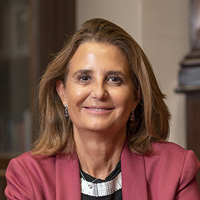Tourism Innovation and Intelligence

The main objective of the Program is to contribute to the competitive improvement of the tourism sector
In view of the new era of tourism that we are facing, which implies a change in the tourism model towards innovation, specialized training in tourism innovation and intelligence is necessary for tourism companies and professionals to launch innovative projects and become the main actors in the development of the tourism sector.
Innovation is essential for companies to improve their processes, increase their competitiveness and efficiently market their products and services in order to satisfy the needs of customers, improving their experience and reaching higher levels of profitability.
On the other hand, intelligence is opening up an infinity of possibilities to understand human behavior and to help identify, more accurately, the opportunities that a company faces in order to focus processes towards greater performance, with a level of more precise adaptation, thus improving the results of the business models that support tourism. It covers destinations, technological infrastructure and models based on artificial intelligence.
Course curriculum 24 ECTS
First Semester 6 ECTS
6 ECTS | Social Responsibility in Tourism
This subject addresses the fundamental principles of sustainability and its relationship with the tourism system. It emphasizes the application of a work methodology in the environment of organizations and processes related to Social Responsibility and sustainability. On the other hand, it highlights the importance of evaluating the social, environmental and economic impacts generated by tourist activity upon destinations. Likewise, it emphasizes the role that tourism companies must play in the application of innovative processes in order to manage the impacts that their activity generates on consumers, employees, local communities, the environment, and on society in general.
Contents:
1. Sustainable tourism and its evolution.
2. Fundamental concepts of CSR in Company Policy.
3. Strategic integration: new intangible competitive advantages.
4. Strategic management of Stakeholders.
5. Ethics and management through values.
6. Governance of the organizational culture.
7. Responsible management of the value chain and circular economy.
8. Corporate Governance and Accountability.
9. Business Communication and Corporate Reputation.
10. Methods of analysis in the environment of organizations and new processes related to CSR and sustainability.
11. Innovation and social economy.
12. Key areas of CSR in the company: economic, environmental and social.
Second Semester 18 ECTS
6 ECTS | Designing technological projects and Big Data in Tourism
In this subject, the development of technological projects is proposed in an efficient way that favors competitiveness and productivity in results through the management and exploitation of large volumes of data (Big Data). The design of these eminently technological solutions will be carried out by taking the established business or research objectives as a reference. In this context, the Big Data of tourism activity, from the point of view of supply and demand, will allow the establishment of the appropriate technological requirements for each case.
Contents:
1. Technological solutions that favor competitiveness and productivity in results.
2. Familiarize the student with the characteristics of a computer solution applied to the tourism sector in order to identify its elements.
3. Formulate the necessary requirements for designing technological solutions for the exploitation of data.
4. Understand and evaluate existing technological alternatives and know the existing options in the current and future market.
5. Analyze the tourism industry through Big Data tools.
6. Identify new business opportunities derived from Big Data.
7. Big Data and the strategic planning processes of tourist destinations.
4 ECTS | Innovation management in Tourism
In order to take advantage of the opportunities that arise from new market trends and know how to develop new disruptive models in tourism, it is necessary to delve into the concept of innovation, identify the key tools to innovate and evaluate the impact of the implementation of innovative solutions in the different areas of an organization. Under this context, it will be possible to define, plan and execute the ideal strategies to create competitive advantages aimed at improving profitability.
Contents:
1. Study of the different methods of innovation management in processes, products and services and in specific areas of the tourism value chain.
2. Know the different models of innovation in tourism, such as intrapreneurship, etc.
3. Apply the appropriate tools to execute business innovation processes.
4. Identify the innovation needs in each area, plan and execute the implementation process.
4 ECTS | Digital transformation
As tourism is a sector in which digitization is having a considerable impact and whose environment is changing rapidly, this subject focuses on enabling students to identify the most widely used technologies in order to undertake the transformation process faced by companies and organizations. Knowledge of these technologies allows the application of the appropriate tools to explore new business models, improve internal processes, generate greater efficiency and provide competitive solutions, among others.
Contents:
1. Learn about the most used technologies in digital transformation.
2. Learn how to apply methodologies focused on improving the organization's digitization processes.
3. Identify the latest digital trends.
4. Evaluate the impact of digital transformation on processes and the value chain.
4 ECTS | Smart tourism destinations
The technological and innovative context in which the world and, in particular, tourism is immersed has generated a new way of defining a tourist destination based on an intelligent system and an innovative technological infrastructure. This course aims to address the common characteristics of smart tourism destinations and the four axes on which the conversion of these destinations is based. The base of this knowledge will help to understand the diagnostic methodology of a destination, based on a system of indicators, and the solutions and action plans that are generated to facilitate the relationship between the agents involved in the destination.
Contenidos:
1. Smart tourism destination: concept and characteristics.
2. Know the four axes on which the Smart Tourism Destination conversion is based.
3. Know and apply the diagnostic methodology of a tourist destination.
4. Know how to analyze the key indicators of tourism management in destinations.
5. Know how to propose solutions and action plans in order to configure a Smart Tourism Destination.
Professors
 Francisco Javier Navarro Meneses
Director del Máster en Empresas y Destinos Turísticos en la Universidad Nebrija
Francisco Javier Navarro Meneses
Director del Máster en Empresas y Destinos Turísticos en la Universidad Nebrija Professor & Researcher (Tourism)
Senior Business Executive
Asignatura: Transformación digital Director Tourism Companies and Destinations
Professor & Researcher (Tourism)
Senior Business Executive
Subject: Digital transformation
 Francisco Femenia-Serra
PhD. Lecturer at Nebrija University
Francisco Femenia-Serra
PhD. Lecturer at Nebrija UniversityAsignatura: Destinos Turísticos Inteligentes PhD. Lecturer at Nebrija University
Subject: Smart Tourist Destinations
 Eva Hurtado Rodrigo
Senior Economist
Eva Hurtado Rodrigo
Senior Economist Advanced Data Analyst & Machine Learning
Tourism Expert
Asignatura: Diseño de proyectos tecnológicos y Big Data en Turismo (asignatura Máster) Senior Economist
Advanced Data Analyst & Machine Learning
Tourism Expert
Subject: Design of technological projects and Big Data in Tourism (Master subject)
Testimonials
Activities
Bachelor’s Degree in Tourism
Study in a unique program, designed with the support of an advisory council made up of UNWTO, Turespaña and the Hospitality Business Confederation of Spain, and which allows students to specialize in the management of tourism and hotel companies.
Nebrija Tourism Week
Collaborative Economy was the central theme in the Tourism Week held at the Madrid-Princesa Campus of Nebrija University, which included experts from the sector.

